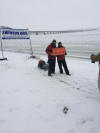

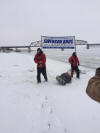
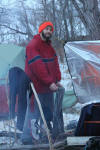

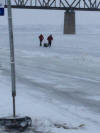
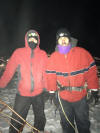
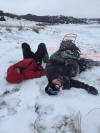
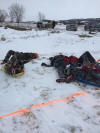

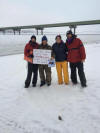
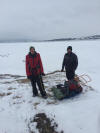





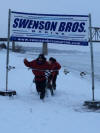
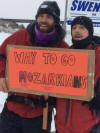
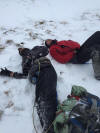

CHAMBERLAIN—With ice caked over his beard and socks rubbing against ripped open blisters, Bruce Pollard broke the plane of the Missouri River Winter Survival Trek finish line.
Pollard was a member of one of the 10 teams of two that completed a grueling 50-mile, three-day, two-night trek along the Missouri River from Platte to the Interstate 90 Bridge in Chamberlain on Saturday.
The 52-year-old from Garretson and his teammate and daughter, Jenna, of Kimball, didn't place first in the race. But Pollard, the oldest contestant in the event, finished alongside one of the most special people in his life—and was all smiles as he did it.
"It was a different environment, but the same relationship," Jenna said. "We pushed each other really hard, like we always do."
In fact, the pair raced each other to the end, with Bruce collapsing face-first as the pair simultaneously tore through the finish line flags.
The competition's winning team was called The Mozarkians, consisting of Trent Harmon, of Arkansas, and T.Jay Sanderson, of Missouri, formerly of Chamberlain. The finished the race in nine hours and 58 minutes. In second place was Sheldon Crooks from Astoria and Tim Frye, of Hendrix, Minnesota. Third place went to Troy Mergen and Eric Majeres, both from Sioux Falls. Jenna and Bruce came in fourth.
The first day, teams were faced with a 20-mile stretch along the east bank of the Missouri river beginning at Dock 44 at the Platte/Winner bridge.
Fresh-faced and eager, 14 teams took to the riverbank, trudging through knee-deep snow for miles-long stretches.
Four teams dropped out of the race along the course.
Warmer temperatures in recent weeks made the ice covering the water not thick enough to support the trekkers, so cutting across to shave time was not an option. Still, several trekkers lost their footing and fell into the frigid water.
Day two
On the second day of the trek, Sanderson and Harmon each fell victim once trying to jump across a gap in the ice.
Sanderson was leading, and when he set his feet to jump, the ice caved and he fell in, submerged up to his shoulders.
"It was shocking," Sanderson said. "Myself, our packs and everything in them got wet and muddy."
Harmon followed Sanderson's lead and fell through, too, but not as deep. After the incident, the pair decided to take a break.
After approximately 30 seconds, the cold began to set in and the Mozarkians knew stopping would do more harm than good.
"If you stop at a point like that, you'll get too cold. I almost proposed laying down for 15 minutes just to rest, but looking back that probably would have been the worst decision ever," Sanderson said. "Our bodies would have chilled, we would have cramped and we would have been done."
For many of the teams, the second day was the toughest. Muscles were sore, the cold was setting in and another 20 miles of hiking was in store.
Additionally, teams were forced to trek through higher drifts of snow.
"If you had to wake up and do 10 miles, that'd be one thing. But to wake up and feel kind of crappy, and still have to do that, it's tough," Jenna said.
But for Will and Cortney Haugen, a husband and wife team from Reliance, the second day also was enlightening.
After entering just to "feel a sense of accomplishment," the pair was exhausted after the first 12 miles of the race.
"On the first day, I was able to experience a level of exhaustion and delirium that I have never experienced before," Will said.
But the couple persevered.
They finished the first day and, even though Cortney didn't believe she'd make it one mile on the second day, the Haugens made it 15 before exhaustion set in and they dropped out.
"We stopped for maybe 30 seconds and our legs literally would not move anymore," Will said.
But they're proud of what they accomplished.
"We didn't finish, but that's the furthest thing from our minds," Will said. "For us it was a big deal."
Jenna and Bruce said the second day was the most grueling. But, Bruce said, "It's just another day. You just do what you have to do, and that's what we did."
About halfway through the second day, teams participated in a shooting event, in which one team member was required to shoot a gun five times at a target.
Each hit took minutes off of the team's overall time.
The rules
There is no physical requirement or endurance test for potential participants of the Survival Trek. Participants must be over the age of 18, but can compete at 16 with a parent or guardian's written consent.
During the race, teams have cell phones in case of emergencies, but using them for anything else is discouraged. Any person-to-person contact with non-participants is against the rules.
The only thing officials of the event provide is firewood at each night's campsite. Otherwise, all of the necessities participants might need must be packed in their gear.
Before the trek begins, officials ask for a gear inventory, and, aside from food, everything must make it to the finish line.
"We don't want them to ditch their gear that last day and just hoof it," event organizer Merrill Ellis said.
Each team member must each complete the course, as well. If one decides to drop out or can't complete the trek, the other partner must exit the race, too.
The penalty for breaking these rules was disqualification.
The trek is considered a race, with the team recording the shortest time on the course being crowned winner.
Times began when teams set out on the course each day and ended when they arrived at predetermined campsites each night, then each of the three legs' times were added together for a total time. Teams had staggered start times and different orders to start each day. Ellis said that was so participants were unaware of which team was leading the race.
"We don't want them to end the race because they think they're behind and there's no chance to win," Ellis said. "We want them to want to finish."
The first-place team receives $5,000, second place gets $1,000 and third place takes home $500.
The event is put on each year by Events by Eco, a group made up of three Chamberlain men—Ellis, Terrance Hickey and Wes Moore.
Competition and camaraderie
"What's really impressive is how they look after each other," Ellis said of the trekkers.
Tight-lipped about their secrets to success, teams don't give away their tricks of the trade to their competitors on the course.
But, after checking into the campsite for the night, teams were often seen building campfires for the worse for wear, talking and playing card games together.
"I knew at the end of the day, no matter how bad my feet hurt, there's going to be six people there we can sit down and visit with and talk about the day," Bruce Pollard said.
After reaching camp the first night, the Haugens, self-proclaimed novice campers, were exhausted and cold. Will was beginning to slip into a state of hypothermia and Cortney couldn't get a fire going quickly enough.
That's when competitors stepped in.
They helped build a campfire and said there would be one waiting for the couple at the next campsite.
Teammates helped each other, too. Sanderson has a background in running and tests of grit and endurance—he once rode his bike from Missouri to Chamberlain on a whim. Harmon is a knowledgeable hunter.
For Sanderson, this made the perfect pair.
"If it was two of me, we might not have made it," Sanderson said. "We wouldn't have had all of the survival things—Trent was a great teammate that way."
The winning duo relied just as heavily on their faith as they did on each other.
"Every day, about 30 minutes in, we'd just thank the Lord for letting us do the trek," Sanderson said. "If you look to Christ on the cross, we can look at that and know He went through suffered more. If He can suffer through that, surely I can suffer, too."
Respect for the river
For many contestants, the Missouri River isn't far from home. Many said they have spent summers along the shore line, but none realized how much different the terrain becomes in the winter.
"It gives you a respect for the river. It's in our backyard, and now we have a different appreciation for it and have experienced it in a new way," Cortney said.
Will agreed, saying the campaign for the event that claims the river is alive "hits the nail on the head."
Not only does it renew a respect for the body of water, it enables participants to build a new respect for themselves and for each other.
Some participants have participated in triathlons and some are everyday people, but all agree on one thing: The trek is "almost unbearable" at times, and anybody who is brave enough to even begin deserves respect.
More importantly, the life lessons learned will stay with the trekkers for a long time to come.
"You really come out of it thinking that you really can do anything you set your mind to," Will said. "You learn a lot about yourself and about each other out there."
And Ellis said the event organizers haven't been able to find a similar event in the United States, so the almost once-in-a-lifetime experience for some of the trekkers, holds a special meaning of its own.
"I would travel anywhere in the United States to do this event," Will said. "The fact that it's in our backyard, it's just a cool event."